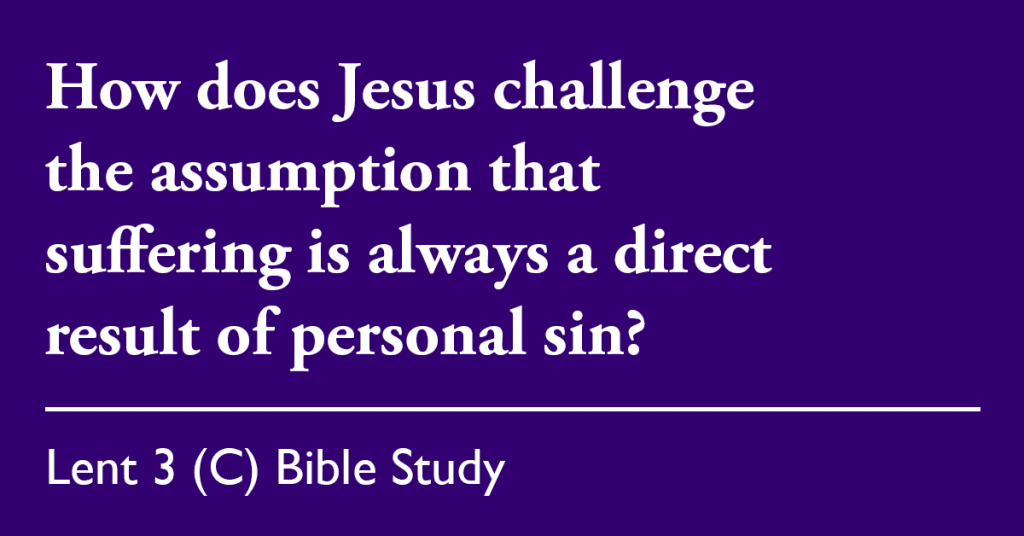This page is available in: Español
Bible Study: Lent 3 (C) – 2025
March 23, 2025
RCL: Luke 13:31-35; Psalm 63:1-8; 1 Corinthians 10:1-13; Luke 13:1-9

Luke 13:31-35
This passage marks Moses’ divine calling, in which he encounters God in the burning bush on Mount Horeb. The miraculous sight draws Moses in, demonstrating that revelation often requires attention and willingness to be interrupted. God identifies as the God of Abraham, Isaac, and Jacob, affirming continuity with Israel’s ancestors while also revealing a name beyond human definition—“I am who I am.” This passage highlights God’s active presence, as God sees the oppression of the Israelites and calls Moses to lead their liberation. Moses’ initial reluctance reflects human insecurity in the face of divine calling, yet God reassures him, not by emphasizing his capabilities, but by promising, “I will be with you.”
- How does Moses’ initial hesitation reflect our own struggles with calling and responsibility?
- What does God’s name—“I am who I am”—reveal about the nature of divine presence and action in the world?
Psalm 63:1-8
Psalm 63 is a deeply personal expression of longing for God, using the imagery of thirst to describe the soul’s desire for divine presence. The psalmist acknowledges that true fulfillment comes not from physical sustenance but from beholding God’s glory. Despite being in a place of need, the psalmist finds contentment in God, declaring that God’s “loving-kindness is better than life itself.” The psalm moves from longing to deep satisfaction, illustrating that God’s presence sustains even in times of hardship. Lent invites us into a similar journey—where fasting, prayer, and meditation shift our reliance from worldly comforts to divine nourishment. The closing verses affirm that God not only satisfies but also protects, as the psalmist clings to God, trusting that God’s right hand holds him fast.
- How does the psalmist’s expression of longing for God resonate with the Lenten journey of self-examination and spiritual hunger?
- In what ways have you experienced God’s presence as both something you seek and something that holds you fast?
1 Corinthians 10:1-13
Paul warns the church at Corinth against complacency by recalling Israel’s failures in the wilderness, despite their many blessings. The Israelites experienced God’s miraculous provision—passing through the sea, receiving spiritual food and drink—yet many still fell into idolatry, immorality, and rebellion. Paul urges the Corinthians to learn from these examples, cautioning them against overconfidence: “So if you think you are standing, watch out that you do not fall.” This passage is especially relevant for Lent, a time of self-examination, as it calls believers to humility and vigilance in their faith. Yet, Paul also offers hope, reminding them that God is faithful and provides a way through every trial. This balance between warning and assurance encourages perseverance, emphasizing that spiritual discipline and trust in God’s grace are necessary for faithful living.
- How does Paul’s warning about overconfidence in faith challenge the way you approach your spiritual journey?
- What does verse 13 teach about enduring temptation and relying on God’s faithfulness in times of trial?
Luke 13:1-9
In this passage, Jesus responds to tragic events—the massacre of Galileans by Pilate and the collapse of the tower of Siloam—to challenge the assumption that suffering is a direct punishment for sin. Rather than explaining these tragedies, Jesus redirects the focus to personal repentance, emphasizing that all people need to turn toward God. He follows this with the parable of the barren fig tree, where the owner is ready to cut it down after three fruitless years, but the gardener pleads for more time and nourishment. This parable captures the tension between judgment and grace—God’s patience offers opportunities for repentance, but those opportunities are not limitless. During Lent, this passage serves as both a warning and an invitation, reminding us that repentance is not just about avoiding judgment but about bearing spiritual fruit in response to God’s mercy.
- How does Jesus challenge the assumption that suffering is always a direct result of personal sin?
- In what ways does the parable of the fig tree encourage both accountability and hope in our spiritual lives?
This page is available in: Español
Don’t forget to subscribe to the Sermons That Work podcast to hear this sermon and more on your favorite podcasting app! Recordings are released the Thursday before each liturgical date.
Receive Free Weekly Sermons That Work Resources!
This page is available in: Español


